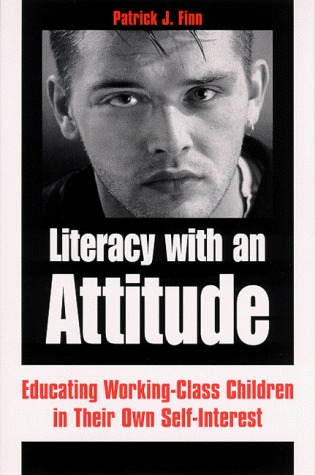 For this Blog post I would like to reflect on the beginning of Patrick Finn's book called Literacy with an Attitude, and connect it to some of the other pieces we have read so far.When Finn talked about teaching at one of his first schools and disciplined his students really well and kept them busy, but did not pay as much attention to if they were really learning anything it made a lot of sense. Many teachers today teach that way; getting your students to basically fear you and obey you and keep quiet can usually be considered a teacher's main goal but then they forget to make sure students are understanding the material and learning what they are being taught. Finn eventually realized he was doing this when he noticed that any actions or punishments he made towards his students were depending on how "obedient or disobedient" they were in class. When he states, "All of us ----teachers and students---- were locked into a system of rules and roles that none of us understood and that did not allow for much in the way of education."
For this Blog post I would like to reflect on the beginning of Patrick Finn's book called Literacy with an Attitude, and connect it to some of the other pieces we have read so far.When Finn talked about teaching at one of his first schools and disciplined his students really well and kept them busy, but did not pay as much attention to if they were really learning anything it made a lot of sense. Many teachers today teach that way; getting your students to basically fear you and obey you and keep quiet can usually be considered a teacher's main goal but then they forget to make sure students are understanding the material and learning what they are being taught. Finn eventually realized he was doing this when he noticed that any actions or punishments he made towards his students were depending on how "obedient or disobedient" they were in class. When he states, "All of us ----teachers and students---- were locked into a system of rules and roles that none of us understood and that did not allow for much in the way of education."
I connect this with Delpit and when she talked about how knowing the rules and codes of power helps you attain power. Finn was basically told the code of power when he was told that his class showed parents what could be done with their students, the assistant principal was telling him that keeping the kids quiet and giving them busy work all the time was the right thing to do. So, this helped him acquire power because he was then feared by his students and was one of the assistant principles favorite classrooms to see. This is what taught him to be a better teacher and made him want to show other teachers the right way to communicate with students, to get them to really learn and listen to you, and to set up the right literacy and language in the class.
In chapter two there was a study done on five public elementary schools and they basically varied from the richest to the poorest schools. This reminded me of Ullucci because it was showing how the kids in the poorest school were not challenged at all and treated like they were incapable of many things but actually had decent IQ's. It also told us where the teachers lived and in the richest schools they lived pretty far away which meant that they were paid well to teach at that school, which meant that usually they would give better education.
Another connection I can make that may seem random is to Tim wise, because although comparing those schools helped us learn a lot about how we should teach all students the same even if they live in poverty and have a tough home life, the fact that these schools were nearly all white was only slightly brought up. It is understandable that it was not talked about in depth because segregation or racism was not a factor for this book, but the fact that there are still so many schools segregated in this way shows that this country is not done making progress with integrating schools.
Hey Caitlyn! I like your reflection, you made a great point especially referring to the beginning of the article with how they became so into the role that they forgot about the teaching and actual learning. It's true and happens more than we think. Often teachers goals seem to be to control the class and thats it. Children need direction and instruction with freedom as well to be creative and express their own opinions and really learn that way. Nicely done =)
ReplyDeleteI really love all your connections! I also thought of Delpit while I was reading but I didn't think of the other two and your explanations for how they connect really help! Great job!
ReplyDeleteI actually didn't think of many of your connections and I really like that you posted yours!
ReplyDelete